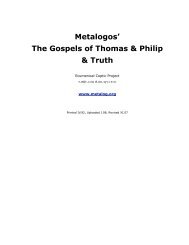Andrew Louth - Syriac Christian Church
Andrew Louth - Syriac Christian Church
Andrew Louth - Syriac Christian Church
Create successful ePaper yourself
Turn your PDF publications into a flip-book with our unique Google optimized e-Paper software.
210 NOTES<br />
hêmin (see On human nature 39 [Morani, 112–14]), which is found in<br />
Aristotle (Nichomachean Ethics., III.3.6; 1112a31).<br />
123 Spoudaios: a term of ultimately Stoic provenance. It is not easy to<br />
translate: it means one who is striving after the virtue, in contrast both<br />
to those who are making no effort, and (in its original Stoic context) to<br />
those—the wise—who have achieved virtue. ‘Serious’ or ‘earnest’ are the<br />
best English has to offer.<br />
124 Maximus provides an etymological explanation for the term for<br />
resentment—mênis—deriving it from menein (‘to remain’) and mnêmê<br />
(‘memory’).<br />
125 Similarly, Maximus derives the word for rancour—kotos—from keisthai<br />
(‘to lie down’).<br />
126 In Gen. 17:5, as a sign of his covenant with Abraham, God changes his<br />
name from Abram to Abraham, as the names are represented in English<br />
bibles. In the LXX the change is from Abram to Abraam, i.e. there is<br />
addition of the letter alpha. According to Philo, Abram meant ‘uplifted<br />
father’ and Abraham ‘elect father of sound’, signifying the good man’s<br />
reasoning (see On the Giants 62–4, and elsewhere).<br />
127 An echo of Plotinus’ ‘flight of the alone to the Alone’ (Enneads, VI.9.11).<br />
128 What Maximus means by this is that Abraham’s ascent to God<br />
involves rejection of everything apart from God, something aptly<br />
signified by the letter alpha, which in Greek is used as a prefix to<br />
indicate negation (the ‘alpha privative’).<br />
129 Lev. 7:30. Maximus follows the LXX, which differs from the Hebrew<br />
(and English bibles based on it), in mentioning the lobe of the liver, in<br />
addition to the fat and the breast. Maximus’ comments are only loosely<br />
based on the Scriptural text (which does not mention the kidneys, even<br />
in the LXX), and really go back to classical philosophy. But Plato links<br />
the incensive power with the heart, and the desiring power with the liver<br />
(Timaeus. 70A–72C) and the same linking is found in Nemesius,<br />
Maximus’ usual source (see On human nature 16, Morani [1987], 73, ll.<br />
12f.). Maximus seems to accept the link between the incensive power<br />
and the heart above, section 44. Galen maintained that the liver was the<br />
source of the blood, which might lie behind Maximus’ association of the<br />
liver and the incensive power (see Taylor [1928], 503).<br />
130 This section is based on Lev. 13, a long discussion of the diagnosis and<br />
treatment of leprosy.<br />
131 Num. 25:6–9.<br />
132 See Num. 25:14f. Maximus’ interpretation of Zambri (in English bibles<br />
Zimri) is traditional: see Wutz (1914–15), 420. Chasbi (English bibles:<br />
Cozbi) is usually interpreted as meaning ‘deceitful’ (see Wutz [1914–15],<br />
951).<br />
133 Cf. Matt. 10:10, Luke 9:3, 10:4, though the text as Maximus cites it<br />
agrees exactly with none of these.<br />
134 Following the emendation suggested in Migne.<br />
135 See Matt. 17:14–21.<br />
136 For the word translated ‘epileptic’ literally means ‘pertaining to the<br />
moon’ (and therefore ‘lunatic’ in older English translations).




